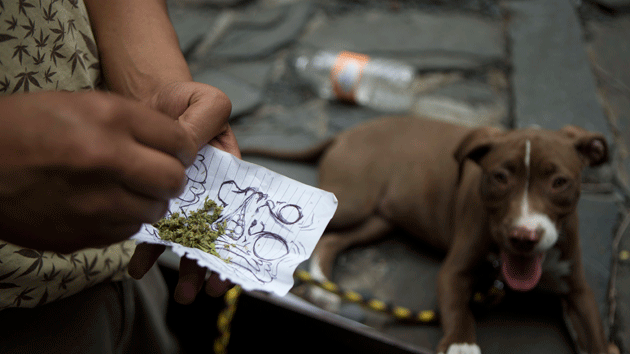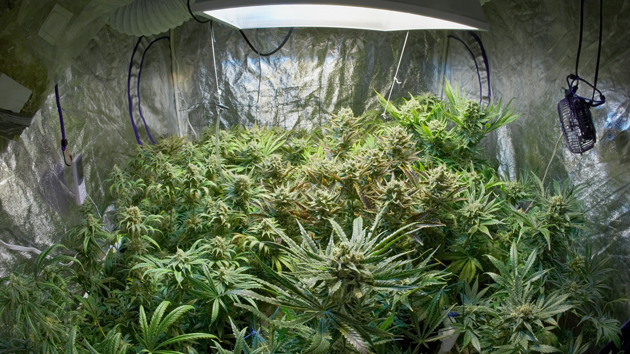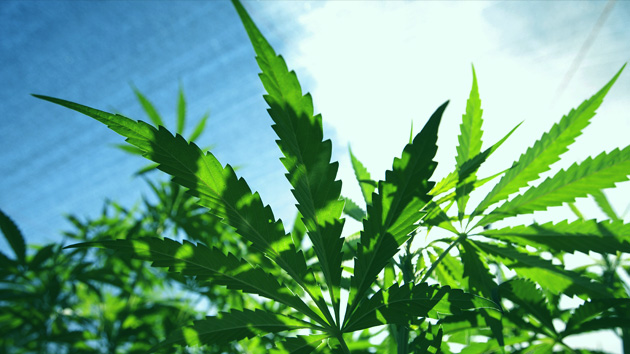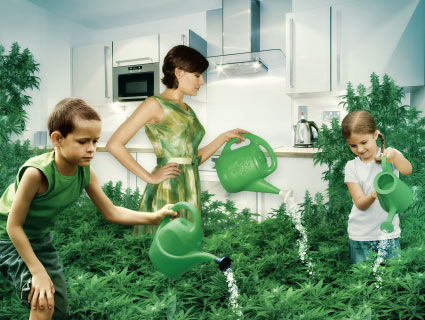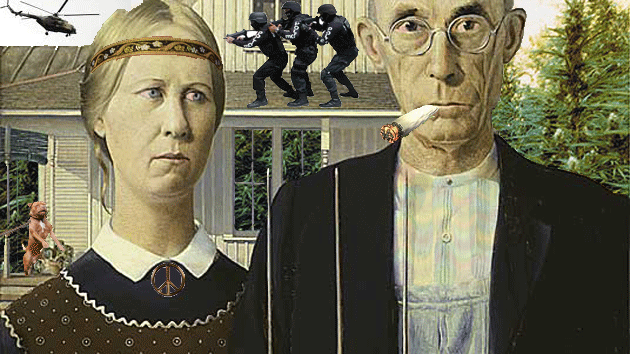
Josh Harkinson
Editor’s note: After our story “The Landscape-Scarring, Energy-Sucking, Wildlife-Killing Reality of Pot Farming” appeared in the magazine, we heard from a reader who called himself Ancient Mariner. He explained that he was one of the old hippies who had fled the cities for the Emerald Triangle back in the ’70s, and ended up making his a living as a pot farmer. He was appalled by the changes he’d seen in the industry in the wake of Proposition 215—the state’s loosely written 1996 medical-marijuana initiative amounted to quasi-legalization, and the ensuing “green rush” has changed the face of cultivation in the region. We confirmed Ancient Mariner’s true identity, made sure he was what he claimed to be, and suggested some edits. We also agreed to let him use a pseudonym so that he could express himself freely without fear of retribution. This is his story.
Some 40 years ago, I packed up my battered Toyota and fled the bleak concrete and smog of San Jose in the Bay Area for Northern California’s Humboldt County. Like a lot of young people back then, my wife and I were fed up with rigid office schedules, urban sprawl, and the intolerance of our straight-laced neighbors. We wanted to go back to the land.
By then, the chainsaws had slain most of Humboldt’s mighty redwoods; spindly tan oaks, buckbrush, manzanita groves, and huckleberry fields were all that was left of the emerald forests. This proved to be an act of ironic serendipity: Now you could buy 300 acres for just 40 grand, or 20 acres for $10,000. Hippie refugees from the southern cities snatched it up quick. Funky homesteads sprung up all over the vast new country. The sun shone in unlikely, hidden places. A new economy was about to emerge, because the hated loggers had let the light in.
I remember the Mexican rag weed growing in the first counterculture vegetable gardens. Times were hard for the early back-to-the-landers. They didn’t even know about males and females. “What’s that yellow stuff?” the dumb hippies asked. (It was pollen—the killer of potency.)
Finally, a smuggler went to Mexico, met the peasants of the Sierra Madre mountains, and shared peyote ecstasy with a Shaman. The Shaman, legend has it, was a sinsemilla farmer. The smuggler came back to the hills of Northern California with moxie and seeds. Enlightened hippies finally learned to sex their plants. Other travelers brought back the famous Kush seeds from Afghanistan. Thus a billion-dollar industry was born.
My wife threw a handful of seeds into our tilled vegetable garden during an early spring rain, and a revelation burst forth from the once useless clay soil. We marveled at our good fortune. Rich, juicy, skunky colas! Who knew? Dealers in San Francisco paid a pretty penny for the new seedless marijuana. This shit was not only stony, it was worth its weight in gold.
The hippies finally had the botanical knowledge, but the local rednecks and ranchers still owned most of the land with good water. So the hippies shared their seeds with the good ol’ boys. Barriers between the two cultures tumbled fast. People always used to say: “Money talks, bullshit walks!”
Of course, we hadn’t come here to get rich. We’d settled our little off-the-grid plot near the Eel River to find the closest thing to paradise. Winter monsoons of white water plunged across the jagged rocks, polishing them into serpentine jade. Springtime creeks danced merrily across leprechaun-green carpets of lichen. Red alder swayed peacefully in the wind of the Indian summer, providing merciful shade for the spawning salmon.
I didn’t know how fragile it all was.
From a butte above the valley one warm day, I watched my children at play in the swimming hole. They jumped in, shockingly cold, screaming euphorically. Then, a hideous, alien snarl. The sound rolled and echoed, bellowing its way across the slumbering canyon walls. A green dragon descended from the ridge. I could see the cops hanging out from the open doors of the Huey combat helicopter, brandishing M16s.
“You fucking assholes, those are little kids down there!” I slid and stumbled from the look-out, nauseated, panicked, angry. At last I reached the beach, the enemy circling overhead. My knees shook as I clutched my children and prayed, like I always have, and always will: “Please God, just one more year.”
Never once had the whirlybirds spotted our plants. Simple camouflage fooled them. My family carved out clandestine trails, crawling like a wolf pack deep into the cherry-red Manzanita jungle. The green sinsemilla intertwined with the trees’ glossy green leaves, pretty mountain roses, and wild river grapevines. We made a life in this enchanted world, even as the cops hauled out nets of confiscated weed from the nearby ranches and timberlands. We laughed at the stupid government and the greedy, busted growers keeping prices high. We’d learned to tread softly in this world. There was no mercy for the arrogant hunter, the user, the exploiter, the killer. Live simply. Take only the resources you need to survive. Be humble. Fit in, lest you become the hunted.
On this day, the chopper rose petulantly, exiting our little piece of paradise as if summoned back by the devil. Two little sprites romped back to their swimming hole unafraid, trained to ignore the monsters. It was part of our family legacy. Outlast the persecutors. That’s how dangerous work got done, how money was made, in the Emerald Forest of long ago.
Now it’s 2014, and here I am driving south again. An old hippie, like an old Casey at the bat. Maybe they’ll need some outdoor this time. Maybe some oldsters suffering from “boomeritis” still smoked organic weed.
The buyer dude with the dispensary makes a screwface when he opens my turkey bag. He’s a techie-looking guy, some venture-capitalist geek with one of those lame-ass company names like “CannabisCompassion.” The guy is wearing a white lab coat. All of the workers are wearing white lab coats. Is this an LSD flashback?
“What strain is this?” Lab Coat asks, doubtfully.
I’m puzzled. “It doesn’t really have a name. It’s grown from seed that I make myself.”
Lab Coat shakes his head with a condescending air. “Sorry, we only buy indoor—it has to be OG Kush, Girl Scout, or Sour Diesel.” He inspects the bud with a jeweler’s tool. “Not enough trichromes, not enough sparkle, won’t pass our lab test.”
My pride is slipping into an ever-widening abyss. “Whaddya mean it doesn’t have enough sparkle?” I’d been growing sinsemilla since before this little twerp was even born. “That shit you see on your indoor dope is the sheen of the pesticides and fungicides they sprayed on it, you moron. Mine’s pretty, green, organic, and gets you stoned. I guess that don’t cut it anymore. Maybe you guys should take off your Halloween costumes and do some real work. Grow some real dope, on real land, with a real sun, instead of killing the planet.”
An obese security guard glares at me, his large gun prominently displayed. “I’m outta here,” I snap. “We never needed cops around on the black market.”
I drive north angrily, longing for the good old days, before anyone had ever heard of “indoor Budweiser weed,” before cowardly dispensaries hijacked the herb, hiding behind their high-priced shroud of legality.
Remember when it took guts to be a grower? Brokers would just hand over the cash for a nice green organic pound. No questions asked, just glad to get door service. Our family would drive home, celebrating the deed, Ma counting the money. The kids wouldn’t have to suffer anymore. We could buy them toys, food, and clothing—have a fun Christmas.
I look down at my arthritic hands—wrinkled, gnarled, stained with red clay. I think of Ma’s little soft hands cradling the toddlers, digging in the hard earth with such determination, sacrificing the easy life for a chance to live free. “Sister Golden Hair,” I called her, after the old America song—her long, curly locks, like woven flax, cascading on porcelain brown skin, kissed by the mighty sun. These were the days of the last frontier, the last Garden of Eden, the last chance to make a dollar that Uncle Sam couldn’t get his hands on. But then the outdoor pot business went south, and Ma and the kids moved to town.
The Conradian Heart of Darkness began in the Emerald Forest in 1996 with the passage of Proposition 215, the “Compassionate Use Act.” The villain from Joseph Conrad’s story, Kurtz, wasn’t hoarding ivory anymore; now he and the new company men, the entrepreneurs of the “green rush,” were mining medical marijuana. They were growing diesel dope. From dawn to dusk, the woods roared grotesquely with bulldozers excavating underground bunkers or erecting huge wooden buildings beneath camo tarps, their walls lined with soundboard and insulation to thwart the thermal sensors from passing police choppers. Fuel trucks ceaselessly delivered “the red blood that makes the bud.” The crack of gunshots and drone of generators marred the once sacred starry nights. Black acrid smoke settled upon the horizons. Soon the red diesel blood ran into the creeks and rivers. One summer, an entire watershed was deemed unfit for human consumption.
Some said Bulgarians were to blame. Others pointed fingers at Mexican cartels. Or it was the redneck ranchers with their land and heavy equipment? There were even rumors of financing coming from the large pot dispensaries in the city. I knew the unspoken truth: Holier-than-thou hippie growers—locals—were also involved in this malevolent trade. Who could resist $4,000 a pound?
The plague spread quickly to towns and cities. Even tweakers and thugs could grow 215 pot. PG&E got very rich. SUVs, monster gas-guzzling trucks, Hummers were driven all over the People’s Commons by indoor-fueled white dreadlocked dudes blasting Jamaican dancehall music. I felt ashamed. This wasn’t paradise anymore. I’d fled the Sodom of the city only to find Gomorrah in the country.
The indoor train ran at bullet speed until the Great Recession hit in 2008. Suddenly diesel and utility grows weren’t profitable anymore. Pot prices dropped like a rock, to levels not seen since the 1980s. I remembered what Huckleberry Finn’s friend Jim once said: “It always gets worse before it gets better again.”
What do you do when you need 10 times more dope to turn a profit? Build greenhouses! With water-intensive, tightly packed greenhouse “depro growing,” you could have three harvests in a season. A-frame buildings covered in clear plastic tarps blanked the hills like fucking Home Depot Garden Centers. The cops counted 4,000 recently on Google Earth.
I could hear the rednecks in my watershed, clear-cutting mountaintops. They graded new roads to nowhere so the water trucks could deliver their stolen loads. Unstable slopes collapsed. Gas-fueled water pumps roared like Harleys 24-7. By August, salmon-bearing creeks near the Mattole River had run dry.
And prices just kept dropping. Down to $1,000 a pound, if you could sell it at all. “Grow more!” Kurtz screamed.
I watched the redneck growers bulldoze facilities right into the creekbed. My pristine homestead water turned an awful shade of brown. What would become of the baby steelhead I’d seen swimming happily in the spring?
All through the hellish summer of 2013, the machines roared at first light. Sounds like automatic weapons and mortars made me jump from sleep. This was worse than diesel dope ever was. This was truly Armageddon in paradise. I didn’t have a greenhouse or a crew. It was just me, clinging to the canyons.
Now I can’t compete. It’s April 2014 and I’m a very worried man. I have a laundry list of who to blame: loggers, tweakers, corrupt city councils, Mr. Cop on the Take, Oaksterdam, elitist environmentalists, Earth First!, entitled ranchers, gun-toting greenhouse cartels, whitewashed politicians making nice with legalization, overpriced hydroponics stores, suit-and-tie venture capitalists jumping on the recreational bandwagon.
There’s even the Institute for Interdisciplinary Marijuana Research at the local college, for God’s sake—as if these highly paid academics had any idea how the working class of the Triangle was struggling to survive on the land. And then there’s NORML and Americans for Safe Access, who seem to think it’s better to buy weed from dispensaries with armed guards and high prices than do business with friendly family farmers.
But who am I to point fingers? I’d damaged the environment, too, just on a smaller scale. I’d taken the money in my greedy hands when the prices were high. I’d pumped water, caused erosion, fertilized with nitrates. I sold clones to diesel operations, and even grew some indoor dope myself. I paid top dollar for a beautiful piece of land with my profits. The parcel was steep, with a creek deep in the ravine—only good for one thing.
Truth be told, I worked for Kurtz. The whole damn Emerald Triangle worked for Kurtz. Remember his last words? “The horror, the horror!”
My wife and I loved wild things, wild lands, and the wild Earth, long before we ever grew our first pot plant. Now we’d have to watch back-to-the-land homesteading end in a heartbreaking environmental apocalypse. Aren’t we better than that?
I know I’m a trespasser in this world. I carry no gun and never kill. It’s part of the job to coexist with the wild things.
Is that why that cougar spared me last summer, screaming a warning before leaping into the black night? Is it why the cute black bear with the white ring around its powerful neck tore up my trailer and ripped the mirrors off my truck but never touched a person? Is it why the gargantuan timber rattler in the river gardens didn’t bite me when I stepped on it, pinning it to the concrete floor of the pumphouse? An interspecies truce—live and let live.
I inspect my new seeds in the last light of the day. Spotted, brown, black; some tiny, some plump, like nano-sized easter eggs—how lovely and fertile they look! Spiritual mystical marijuana waiting for the miracle of germination. It was a very simple interaction of soil, sun, and water that had created a good life for people in the Emerald Triangle. On the most basic level, we’ll still always have herb and food to sustain us.
I’ll plant my seeds again this year. I can’t help myself—it’s in my blood. I’ll have to change, though. I’ll use a small hydraulic pump powered by gravity, instead of gasoline. Only enough water to sustain my tiny homestead. I’ll plant willow starts to stabilize the eroding riparian zones. In the winter months, I’ll store rainwater. I’ve gotta start somewhere, so I’ll start with myself.
Maybe I can recapture the idealism that brought me to the Northern California wilderness in the first place. Maybe I’ll grow some food too. I’ll still walk through the woods like the ghosts of the people who lived here before. I can still discover the old sacred truths, because now the work is more meaningful than ever. It is time to restore the Emerald Forest, so a way of life can endure.
